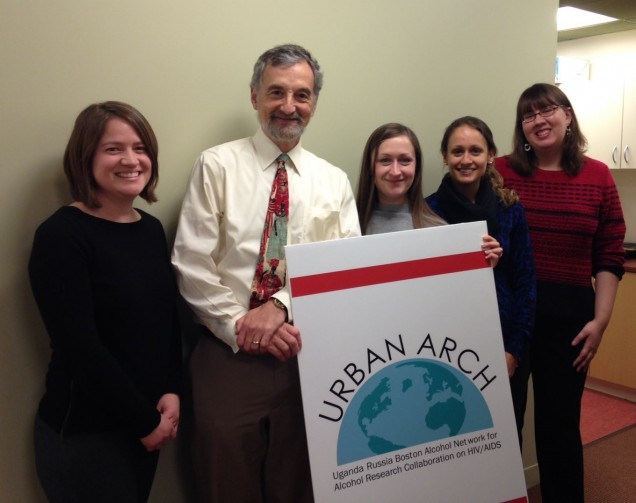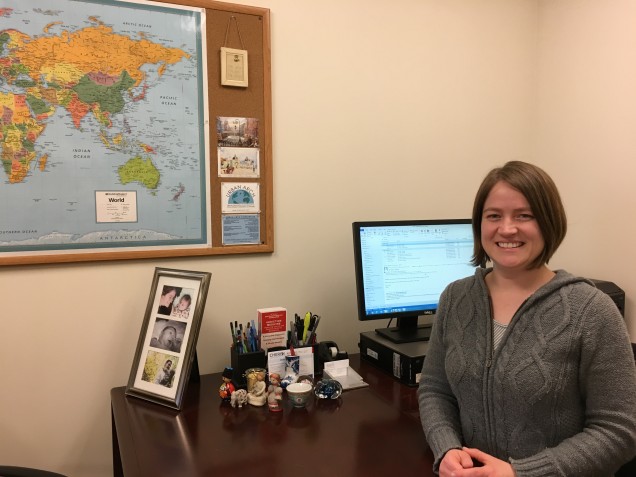Spotlight On…Carly Bridden
Spotlight On…Carly Bridden
Carly Bridden, MA, MPH, Administrative Director of URBAN ARCH and Clinical Research Director in the Clinical Addiction Research and Education (CARE) Unit at Boston Medical Center
As told to URBAN ARCH Admin Core staff, December 2016
Tell us more about your background. How did you become involved in substance use and HIV research and URBAN ARCH?
As an undergrad, I was an anthropology major, and I really liked learning about how other cultures view illness and approach healthcare. I became interested in medical anthropology and applied anthropology, and specifically how you can use cultural beliefs to influence positive health behaviors. I went back to get my masters in applied anthropology with a focus on medical anthropology, in a dual MA/MPH program. Within public health, I concentrated in maternal and child health, and I was really interested in nutrition and childhood obesity. As a student, I also worked at a VA hospital in the employee education office, where I was exposed to education programs. I coordinated an employee customer service program, actually called the CARE (Connect Appreciate Respond and Empower) Program, which has helped me as a public health and administrative professional. Working in the employee education office also provided me the opportunity to conduct a qualitative study for my master’s thesis. I performed a needs assessment for the workplace wellness program to assess the needs of Hispanic female employees. Because of that experience I knew I really enjoyed research.
When I was applying for jobs after graduation, I was looking at health promotion and research oriented jobs in Tampa, Atlanta, and Boston, and I found this research coordinator position in the CARE Unit at Boston Medical Center (BMC) that I was really excited about. I liked the idea of being a coordinator on research studies and exposed to different projects, while getting to work with investigators and teams to see how these projects were developed, implemented, evaluated and results published. I started working here in 2003 with Jeffrey Samet, and since then I’ve just grown in the position and taken on different projects and studies that Jeffrey has been involved with. Addiction and HIV wasn’t something I focused on as a student, but I became interested in it as a result of working here. It definitely fit my public health background too – trying to improve health behaviors and outcomes. After a few years, I became involved in the Russia studies, which I really liked because of my anthropology background.
What do you enjoy most about working on URBAN ARCH?
I like that my role is administrative but also research-focused. I started very hands-on as a research coordinator and research project manager and became really involved with studies being implemented. As the years have gone on, my work has gotten more behind-the-scenes and administrative, but I still get to use the knowledge I have obtained over the years working with different research studies. Even now, I’m not just coordinating meetings or subcontracts, but I feel like I contribute to the research design and the analysis of studies. I also love that URBAN ARCH is a big consortium, and we get to work with lots of different people and there’s an opportunity to grow. We were successful with the renewal in proposing new studies, and we’re starting to work with additional collaborators and investigators who are using URBAN ARCH data, so it just feels like it’s a live entity that’s growing and productive.

l-r: URBAN ARCH Admin Core team (Carly Bridden, Jeffrey Samet, Natalia Gnatienko, Sally Bendiks, and Julia Canfield)
As Administrative Director, what has been the most surprising challenge you have experienced working on URBAN ARCH? How have you been able to address it?
The most surprising thing is now that we’re working with lots of other groups, you have to change your mindset a little or adapt based on who you’re working with, and not be so set in your ways. Appreciating that people come from different institutions or backgrounds and therefore learning from them about what works well. Then maybe we can improve the way we do things. Something I’ve learned is not to be so rigid and structured in our processes, but be more open-minded to changes and improvements.
Another challenge, particularly in the first few years of the consortium, were resource constraints and trying to do too much with limited resources. It’s hard when the teams have great ideas and want to do big projects, but sometimes things just end up costing more than anticipated or funding gets cut, and it’s harder to do what we originally proposed. Everyone wants to do a great job and do as much as they can, but there comes a point when it’s not feasible. The challenge is trying to find a balance as a group between doing as much as we can while recognizing when it’s too much and might need to adjust. We have used a few different tactics to overcome this: sometimes we shift responsibilities so someone else with more time takes the lead, or we simplify processes to have a different method but achieve the same results. And in the end, maybe it’s just resetting our expectations and scaling down.
What are you most excited about for the future of URBAN ARCH in the next 5 years?
I think the idea that we’re going to get bigger, continue to do more research, and expand beyond the original cohorts is most exciting. In the beginning, we had some success with supplements and securing additional grants, but we were really focused on the three main cohorts. And now, I see new outside studies being proposed that take advantage of the original cohorts and the URBAN ARCH infrastructure, and I think as time goes on we will continue to grow with studies and have more varied aims and focus.
What advice do you have for other research administrators?
I think trying to be really helpful in all capacities. Don’t have a limited view of your role, but try to have your eyes open for ways that you can implement something new or make a new connection between faculty members. It’s good to be aware of what your group does, so when you hear about something else, you have in the back of your mind how to take advantage of that to bring people together. Also, have great staff to work with. Trust that they know what they’re doing and try not to do everything yourself. If you train people well, trust them, and give guidance along the way, everyone will benefit.
Tell us something surprising about yourself.
Between my undergrad and graduate degrees, I took a year off and went to the UK. I worked a lot of different temporary jobs while I was there: A bartender in a nightclub, at the Scottish Widows insurance company, and at some cafes. I even worked for the Royal Mail for two days, but I couldn’t stand it. At the time it was (mostly) fun doing those jobs, but I learned that I wanted to do something more academic and focused on health and research. Also, while I was in England, I met my husband, and we got engaged soon after I moved back to the States. And now we have two beautiful children.
